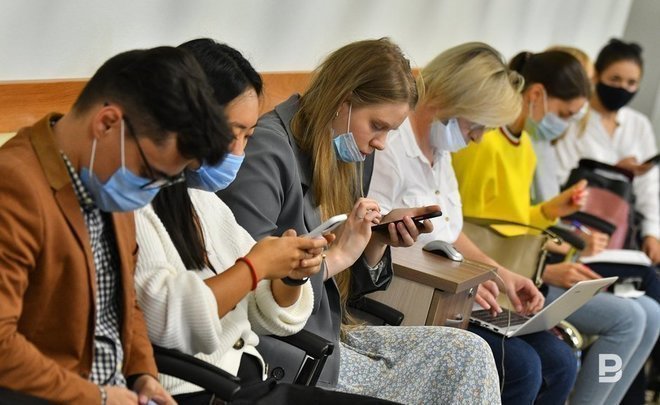Tatarstan residents began to talk much less on the phone
As Realnoe Vremya calculated, the cumulative duration of calls in the republic has fallen from 21,5 years to 20 years over the year

Reduction in the duration of conversations on mobile phones is an all-Russian trend. Last year, the population of the country and Tatarstan residents spent by 7% less time on cell phone calls. As the analytical service of Realnoe Vremya calculated, having studied the data of the Ministry of Digital Development, residents of the republic talked only 10,3 million minutes (19 years, 11 months) against 11,1 million minutes (21,5 years) a year earlier. Interestingly, the decline dynamics differs significantly from region to region. For example, residents of Krasnodar Krai (-12,8%) and Bashkortostan (-9,6%) reduced the duration of mobile calls the most in the country. But Tatarstan residents have even more noticeably reduced communication by landlines — by almost a quarter, and only the residents of Samara and Moscow have surpassed Tatarstan in this.
In 2022, Tatarstan residents spoke on mobile for a total of 20 years
In 2022, the duration of mobile calls in Russia fell by 6,9%. If in 2021 the residents of the country talked on the phones for almost 462 million minutes, then last year it was about 430 minutes.
Tatarstan entered the top 10 regions with the longest duration of mobile phone calls in the 7th place. However, everyone in this top ten had a noticeable decrease in the duration of calls over the year.
The residents of Krasnodar Krai — by 12,8%, Bashkiria — by 9,6% and Sverdlovsk Oblast — by 8,7% reduced mobile phone calls the most. The republic has an all-Russian average in this rating — 6,9%, Tatarstan residents spoke for 10,3 million minutes against 11,1 million a year earlier. But if we translate this time into years, we will get almost 20 years — we spent so much time talking on mobile last year.
Money saving and affordable Internet
The boom in the development of other communication formats contributed to the decline in mobile conversations. Russians got used to them even during the coronavirus pandemic and the lockdown forced in connection with it. For several months, most of the country's residents were in remote work mode, and communication with colleagues was mostly through Skype, Zoom, or WhatsApp services. Thus, the traffic of traditional work calls began to drop noticeably both in number and in minutes spent on conversations.
But even after the removal of Covid restrictions, the communication of Russians in messengers and social networks with call functions continued to grow. As a result, voice traffic noticeably dropped. According to experts, this trend in the country was outlined in 2015, but from 2019 it began to acquire a mass character. Today, many subscribers prefer to leave messages in messengers, including voice, to ordinary mobile calls.
As the press service of MegaFon told Realnoe Vremya, in Tatarstan in 2022, on the contrary, they recorded, although insignificant, but an increase in voice traffic — up to 5%. However, already in the first quarter of this year, there was a reverse trend — the volume of minutes fell by 8%. On average, every month a Tatarstan resident spends about 360 minutes talking on a mobile phone through this operator. But lately, subscribers are transferring more and more calls to messengers.
“Internet traffic in our users' smartphones continues to grow. In 2022, the volume of downloaded data increased by 33%. In the first quarter of 2023, the increase is still less — it remains at the level of 15%. By May, Internet traffic in messaging services increased by 80% compared to the same period last year. Telegram is the leader among applications — this service accounts for 69% of the total messenger traffic, and its share in Tatarstan has grown by 10% over the year, the company reported.”
Experts also associate the reduction of mobile calls with the wide availability of Internet services and large coverage of 4G networks — high-speed mobile Internet gives the opportunity to talk without time limits and has more features, such as video calling. As a result, Internet traffic has also begun to grow constantly, and subscribers are increasingly willing to switch to unlimited offers.
“Communication in messengers and social networks is already a familiar phenomenon for everyone, so a decrease in voice and an increase in Internet traffic is a natural phenomenon. Last year, subscribers of the MTS ecosystem in Tatarstan spoke by 7,2% less minutes than in 2021. The increase in the volume of Internet traffic over the same period amounted to 6,9%," said Marat Shakirov, the director of MTS in Tatarstan.

According to Mediascope, in 2022 in Russia, the total Internet audience per month was 98,6 million people — 81% of the country's population. 78% of Russians use the Internet every day. Smartphones are the leaders in terms of usage time — people from 12 to 24 years old spend more than 90% of all time on the Internet in them, those from 25 to 34 years old — 92%. Messengers take the third place among the largest types of activity in smartphones — they account for 16%. In the first two places — social networks and watching video.
Landline communication is becoming a thing of the past
The decline in calls in Russia is noticeable not only on mobile, but also on landline. Here, a drop is much greater — 16,4%, the volume of minutes has fallen from 40,2 million to 33,6 million nationwide. Residents of Samara Oblast reduced their communication by landlines the most — by 26% at once, from 1,1 million minutes to 887 thousand. Moscow residents had the smallest decline — 7,4%, or 12,3 million minutes against 13,3 million a year earlier.
Tatarstan is the third in this rating: residents of the republic reduced conversations on wired telephony by almost 23% — from 943 thousand minutes to 728 thousand.
According to experts, the dynamic growth of sales in the Russian smartphone market played a role here.
Russians spent almost half a trillion rubles on mobile communications over the year
However, data on the number of devices connected to the mobile network in 2022 show negative indicators almost throughout the country. Thus, according to the Ministry of Digital Development, Russians have become 2% less likely to purchase mobile communications — the number of devices connected to the network has decreased from 321,7 million to 315,2 million units over the year. Bashkortostan showed the greatest negative dynamics, where the indicator has fallen by 7,7%. The smallest drop — 0,5% — was recorded in Sverdlovsk Oblast. Tatarstan is the fifth in terms of the dynamics of decline — 2,4%.
The only region of Russia where the number of devices connected to mobile communications has increased is Nizhny Novgorod Oblast — from 8,7 million to 8,9 million units.
The refusal of calls by mobile phone in favour of communication in messengers is partly facilitated by the mobile operators themselves, namely their tariffs. Usually, subscribers are offered a limited number of free minutes and a significant amount of gigabytes for Internet traffic.
Plus, it is more profitable to call by a messenger in terms of saving, since free calls are possible only between subscribers of the same operator.
However, the prices of Russian operators for mobile Internet services have begun to rise, although they are still considered among the lowest in the world. According to telecom operators, in 2022 the price increase ranged from 2% to 15%. Among the reasons -inflation, encumbrances on the installation of special equipment for communication companies and difficulties with the purchase of new equipment.
Russians' spending on mobile communication services in 2022 increased by an average of 1,7% to 462,4 billion rubles. In 2021, this amount was 454,6 billion. Moscow residents spent the most — their expenses increased by 7,7% compared to 2021, amounting to 121,5 billion rubles.
On the contrary, the residents of Krasnodar Krai have reduced mobile communication costs by 4% to 20 billion rubles. The republic is the sixth in this rating. Tatarstan residents, as well as a year earlier, paid 10,2 billion rubles to telecom operators.